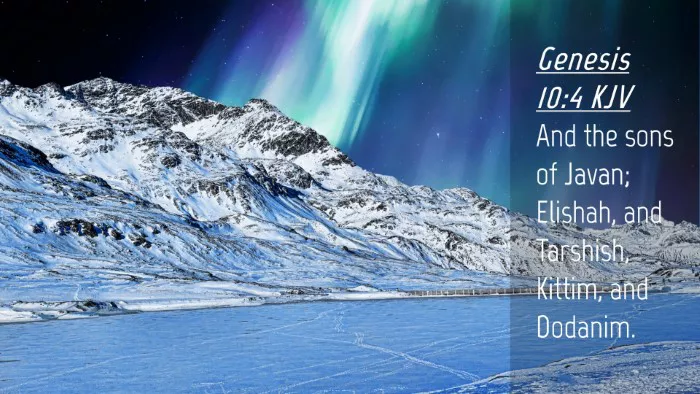Strengthen your spiritual journey with the daily Bible verse Genesis 10:4.
Genesis 10:4 (KJV)
“The sons of Javan were Resha, Tarshish, Kittim, and Dodanim.”
Background
Genesis 10:4 is part of the “Table of Nations” in the Book of Genesis, which outlines the descendants of Noah’s sons after the Flood. This chapter, often called the “Table of Nations,” lists the genealogies of the nations that descended from Noah’s sons Shem, Ham, and Japheth. Specifically, Genesis 10:4 tells of the descendants of Japheth, focusing on his sons and their impact in the ancient world.
See also: Genesis 10:1-32 (Berea Study Bible)
Perspective
In Genesis 10:4, the descendants of Japheth are mentioned: Elisha, Tarshish, Kittim, and Dodanim. Each of these names represents a group of people or a region in the ancient Near East:
Elishah: probably refers to a group of people living in the Aegean region, possibly in an area associated with a Greek island.
Tarsh: usually associated with a distant trading location, probably in the western Mediterranean, known for its wealth and trade.
Kittim: usually associated with Finland or adjacent areas of the Aegean and Mediterranean Seas.
Dodhanim: poorly documented, but probably associated with the Aegean Sea or the area surrounding it.
This verse emphasizes the distribution of Japheth’s descendants in different regions and their role in the development of different nations and cultures.
Application of Genesis 10:4 in Life
Genesis 10:4 illustrates the idea that cultural and geographical diversity stems from a common ancestor. It can inspire modern readers to appreciate the civilizations of human history and understand the interconnectedness of different cultures. Understanding the background history of these names can promote a greater appreciation of the spread of civilizations and contributions to global culture.
Comparisons to Other Biblical Texts
Genesis 10:4 can be compared to other genealogical lists in the Bible, such as those in Chronicles and the New Testament. For example, the genealogy in Chronicles 1-3 records the descendants of Noah’s sons in more detail, while the New Testament genealogy traces the lineage of Jesus, emphasizing the importance of ancestors in the biblical narrative.
Modern Relevance
The modern relevance of Genesis 10:4 is to remind us of the early spread of humanity across the globe. In today’s context, the Bible emphasizes the importance of understanding our common history and the diverse origins of different cultures. It encourages people to respect and appreciate cultural diversity and historical connections.
Conclusion
Genesis 10:4 provides an in-depth analysis of the early human dispersion after the flood and emphasizes the different origins of various ancient civilizations. By exploring this verse, readers can gain a deeper understanding of the historical and cultural development of the processing world. The genealogical record demonstrates the interconnectedness of humanity and the rich history before the modern era.
Genesis 10:4 Comments
Historical Significance: Genesis 10:4 provides important insights into the geographic and cultural spread of Japheth’s descendants, and provides an indication of the layout of the ancient world.
Cultural Influence: The names mentioned in this verse reflect the role played by important regions and cultures in the development of ancient civilizations.
Genealogical Context: This verse is part of a larger genealogical framework that helps to connect biblical history to the origins of various nations.
Theological Perspective: This verse can be emphasized to emphasize God‘s plan for the dispersion of humanity and the establishment of a multicultural society on Earth.


